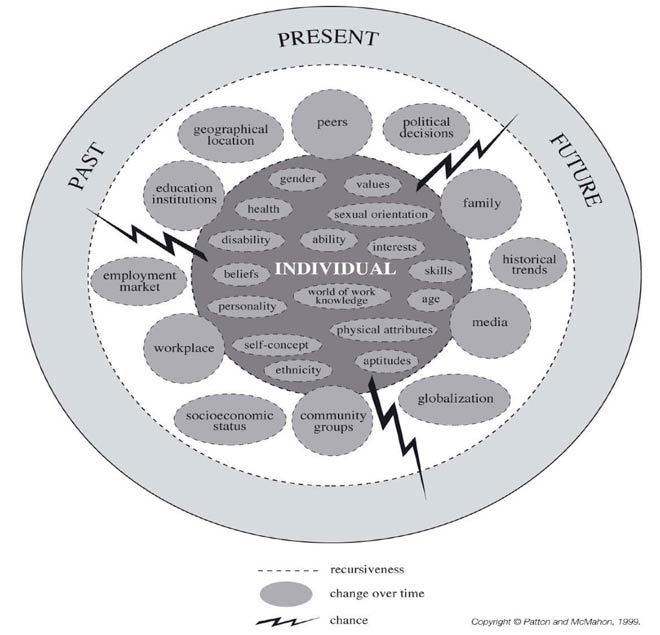relationships

How well do you know your friends? (…)
There are lots of ways to know someone’s personality. You can say “she’s an extrovert” or “she’s usually happy.” You may also know how he or she reacts to different situations and other people’s behavior. “It’s a more detailed way of understanding personality,” says Charity A. Friesen, a graduate student at Wilfrid Laurier University, who co-wrote a new paper with Lara K. Kammrath.
“You might know the person is extroverted when they’re out with their friends but more introverted when they’re in a new situation.” When a person is faced with one of a list of situations, then how does he or she behave? Friesen identifies this as an “if-then profile.” (…)
Some people knew their friends’ triggers well; others had almost no idea what set their friends off. And that made a difference to the friendship. People who had more knowledge of their friend’s if-then profile of triggers had better relationships. They had less conflict with the friend and less frustration with the relationship.
{ APS | Continue reading }
psychology, relationships | March 25th, 2011 7:26 pm

Despite wide acceptance of the stereotype that women apologize more readily than men, there is little systematic evidence to support this stereotype or its supposed bases (e.g., men’s fragile egos). We designed two studies to examine whether gender differences in apology behavior exist and, if so, why. (…)
Findings suggest that men apologize less frequently than women because they have a higher threshold for what constitutes offensive behavior.
{ Psychological Science/SAGE | Continue reading }
psychology, relationships | March 23rd, 2011 5:06 pm
relationships, science | March 21st, 2011 3:42 pm

In all of negotiation, there is no bigger trap than “fairness.”
This chapter from the Negotiator’s Fieldbook explains why among multiple models of fairness, people tend to believe that the one that applies here is the one that happens to favor them. This often creates a bitter element in negotiation, as each party proceeds from the unexamined assumption that its standpoint is the truly fair one.
For a negotiation to end well, it is imperative for both parties to assess the fairness of their own proposals from multiple points of view, not just their instinctive one – and to consider the fairness of their negotiation procedures as well as of their substantive proposals.
{ Perceptions of Fairness | PDF }
ideas, relationships | March 18th, 2011 5:44 pm

Speed dating was built on the principle that you can learn A LOT about someone in the first few minutes of meeting them. This is true. Even within 30 seconds we are pretty good at picking out the broad stuff, like if someone is extraverted or curious. This tells us if someone is a possible dating prospect.
In theory adding choice or variety to that process should lead to a better selection. When you meet a bunch of people you can raise your standards on what is important and you end up with a better choice. It doesn’t happen this way.
Allison Lenton and Marco Francesconi just published a paper looking at how choice impacts our ability to select a prospective partner. They looked at 84 speed dating events where single men and women meet a bunch of prospective partners during a series of short mini-dates. At the end of the evening each person gets to pick out who they would like to exchange numbers with, and if both agree then they get each other’s contact information.
Lenton and Francesconi found that having a lot of choice, and a lot of variety within your choices, leads you to making a worse decision, or even no decision at all. People who had greater variety in their choices (i.e., range in age, height, occupation, etc.) selected fewer people to meet and were less likely to want to meet the best prospect . The authors conclude that too much choice makes us confused and we end up doing nothing.
{ eHarmoy Labs | Continue reading }
photos { Melvin Sokolsky, Harper’s Bazaar “Fly” Spring Collection, 1965 }
psychology, relationships | March 16th, 2011 10:11 am

Every time some human attribute is said to be unique, whether tool-making or language or warfare, biologists soon find some plausible precursor in animals that makes the ability less distinctive.
Still, humans are vastly different from other animals, however hard the difference may be to define. A cascade of events, some the work of natural selection, some just plain accidents, propelled the human lineage far from the destiny of being just another ape, down an unexpected evolutionary path to become perhaps the strangest blossom on the ample tree of life.
And what was the prime mover, the dislodged stone that set this eventful cascade in motion? It was, perhaps, the invention of weapons — an event that let human ancestors escape the brutal tyranny of the alpha male that dominated ape societies.
Biologists have little hesitation in linking humans’ success to their sociality. The ability to cooperate, to make individuals subordinate their strong sense of self-interest to the needs of the group, lies at the root of human achievement.
{ NY Times | Continue reading }
photo { Lynn Davis }
relationships, science | March 15th, 2011 5:23 pm

The brain may manage anger differently depending on whether we’re lying down or sitting up, according to a study published in Psychological Science that may also have worrying implications for how we are trying to understand brain function. (…)
A field of study called ‘embodied cognition‘ has found lots of curious interactions between how the mind and brain manage our responses depending on the possibilities for action.
For example, we perceive distances as shorter when we have a tool in our hand and intend to use it, and wearing a heavy backpack causes hills to appear steeper.
{ Mind Hacks | Continue reading }
brain, psychology, relationships | March 10th, 2011 5:48 pm

An investigation conducted at the Edinburugh Science Festival by psychologists James Houran, Caroline Watt and Richard Wiseman looked into what topics of conversation are the most sucessful in a dating situation. One hundred randomly selected participants (50 men and 50 women) engaged in the scientific speed dating. (…)
Talking about films was the least successful topic with only 9% saying that they would like to see the other person again, whilst 18% who discussed travel (the most popular topic) wanted to meet again. The poor showing for film was attributed to the differences in film tastes between men and women, also Wiseman observed that whenever he walked past the film table the participants were just arguing!
Also discovered was that 45% of womens descisions were made during the first 30 seconds, whilst only 22% of men made their descision in that time.
{ B Good Science | Continue reading }
relationships | March 10th, 2011 5:16 pm

Supposing truth is a woman - what then? Are there not grounds for the suspicion that all philosophers, insofar as they were dogmatists, have been very inexpert about women? That the gruesome seriousness, the clumsy obtrusiveness with which they have usually approached truth so far have been awkward and very improper methods for winning a woman’s heart?
{ Friedrich Nietzsche, Beyond Good and Evil, 1885-86 | Continue reading }
related { circa 1730: Female orgasm officially demoted. }
nietzsche, relationships | March 8th, 2011 8:15 pm

A psych study asked people to think of someone they felt guilty toward, or made them imagine feeling guilty toward someone (e.g., slacking off on a joint project, or being careless with something borrowed). Researchers then had these guilty folks divide up money between themselves, the victim, and a third party (e.g., a deserving charity or random person). Compared to controlled conditions, such people give more money to the victim, but at the expense of the third party, not themselves.
{ OvercomingBias | Continue reading }
collage { Mark Wagner }
psychology, relationships | March 8th, 2011 7:00 pm

We are now looking at a situation where electronic communication is with us at all times and the boundaries between internet and real life communication are becoming increasingly blurred. (…)
Facebook users have a mixture of what would be termed as weak ties (friends a user has a marginal link to), and close ties (friends with whom they maintain a close relationship) in one place. Developing weak ties is one of the primary sources for people using Facebook. Romantic relationships may only represent a small part of a person’s Facebook usage it is nevertheless the most public place a couple will represent themselves. Muize found there was a correlation between the time a user spends on Facebook and relationship jealousy, while Boyd and Lewis showed Facebook to be an environment that can impact upon an intimate relationship.
Much of the literature, however, has focused on the value of maintaining weak ties and enhancing social capital. This paper will take a different stance and compare how certain rituals on Facebook can impact a person’s intimate relationships on the offline environment.
{ Journal of Comparative Research in Anthropology and Sociology, | PDF }
image { Nam June Paik, Homage to Stanley Brown, 1984 | Stedelijk Museum }
relationships, social networks | March 7th, 2011 6:42 pm

We modify our own opinions in line with what other people think, especially our friends and peers.
A problem for psychologists investigating the effect of peer influence is that it can be tricky to tell whether people are simply acquiescing in public, for show, or if their attitudes really have changed.
A new study by a team of psychologists at Harvard University has used an innovative mix of behavioural and brain-scan methods to show that peer influence really can change how people value something, in this case the attractiveness of a face.
{ BPS | Continue reading }
photos { William Klein, Man Foreground, Woman Behind, 1955 | Right: Man Ray, Self-Portrait with Meret Oppenheim, 1933 }
halves-pairs, photogs, psychology, relationships | March 7th, 2011 6:25 pm

{ Our results show that dog and cat owners use these sites quite differently. While dog owners focus on their relationship with their pets and looking for advice, cat owners tend to use the site more to build community. Both results show that these pet social networks are already being used to help support the human–animal bond online. | First Monday | full story }
dogs, relationships, technology | March 7th, 2011 6:20 pm

New findings provide further evidence that abstract concepts are grounded in sensory metaphors. Just as holding a heavy object makes us perceive an issue as being more important, and physical warmth makes us perceive an interpersonal relationship as also being warm, so does touching something tough or tender influence our mental representation of social categories such as sex.
{ Neurophilosophy | Continue reading }
photo { Jill Freedman }
psychology, relationships | March 2nd, 2011 7:20 pm

New research out of Brigham Young University finds that couples who wait to have sex are happier, and that delaying sex could lead to a healthier marriage. “I think it’s because [those who waited] learned to talk and have the skills to work with issues that come up,” says scientist Dean Busby, the study’s lead author. (…)
It’s possible for a man to be allergic to his own semen, according to Dutch scientists who have been studying post-orgasmic illness syndrome, a condition in which men develop flu-like symptoms after ejaculating.
{ The Week | Continue reading }
photo { Dominico Albion | more }
relationships, science, sex-oriented | March 2nd, 2011 7:00 pm

Not only do insincere apologies fail to make amends, they can also cause damage by making us feel angry and distrustful towards those who are trying to trick us into forgiving them.
Even sincere apologies are just the start of the repair process. Although we expect the words “I’m sorry” to do the trick, they don’t do nearly as much as we expect.
{ PsyBlog | Continue reading }
photo { Richard Misrach }
psychology, relationships, shit talkers | March 1st, 2011 8:08 pm

Life presents all too many situations in which we’re forced to place our trust in people we’ve no particular reason to trust. The classic example is driving: you can buy the safest car available, and take all the advanced driving tests you like, but hitting the road is still ultimately a matter of entrusting your fate to hundreds of strangers – people who, by definition, you’d never leave your kids with, and who might, for all you know, be drunk, high, overtired, hallucinating, prone to uncontrollable violent outbursts, convinced they’re immortal deities from alien planets, or just massively stupid.
Except for giving up driving, there’s not much you can do about this. But it was only a few months back, heeding the urgings of several writers on productivity, that I came to realise that a somewhat analogous, if mercifully less lethal, situation pertained in many areas of my life – because I wasn’t keeping a “waiting-for list”.
The argument runs as follows: multiple times a day, at work or outside it, most of us make requests of people – underlings, superiors, friends, service providers – and simply assume they’ll follow through. (…)
Based on an unscientific survey of my acquaintances, what proportion of people have a systematic way to keep track of who they’re waiting to hear back from? Zero per cent, approximately.
It turns out that keeping a “waiting-for” list is like being handed a pair of x-ray spectacles for peering inside your colleagues’ lives. Based on what does or doesn’t get crossed off the list, as people do or don’t get back to me, I’m pretty sure I now know who’s on top of things, and who’s inefficient or just lazy, their email inboxes backed up like clogged drains.
{ Oliver Burkeman /The Guardian | Continue reading }
experience, relationships | February 28th, 2011 6:02 pm

We usually think of emotions as conveyed through facial expressions and body language. Science too has focused on these forms of emotional communication, finding that there’s a high degree of consistency across cultures. It’s only in the last few years that psychologists have looked at whether and how the emotions can be communicated purely through touch.
A 2006 study by Matthew Hertenstein demonstrated that strangers could accurately communicate the ‘universal’ emotions of anger, fear, disgust, love, gratitude, and sympathy, purely through touches to the forearm, but not the ‘prosocial’ emotions of surprise, happiness and sadness, nor the ’self-focused’ emotions of embarrassment, envy and pride.
Now Erin Thompson and James Hampton have added to this nascent literature by comparing the accuracy of touch-based emotional communication between strangers and between those who are romantically involved. (…)
The key finding is that although strangers performed well for most emotions, romantic couples tended to be superior, especially for the self-focused emotions of embarrassment, envy and pride.
{ BPS | Continue reading }
images { The Thomas Crown Affair, 1968, directed by Norman Jewison }
psychology, relationships, science | February 26th, 2011 7:27 pm

Has warfare been handed down to us through millions of years of evolution? Is it part of who we are as a species? At the heart of this question is whether humans have a natural capacity to kill other humans.
Some social scientists have concluded that evolution has in fact left us with this unfortunate ability.
Primatologist Richard Wrangham, a major proponent of this idea, developed the “Imbalance of Power Hypothesis” to explain how evolution could produce a propensity for warfare in humans.
The idea is that our primate ancestors could have gained access to additional food and other resources by attacking and killing their neighbors. Of course, these deadly attacks would have only been worthwhile if the attackers could ensure their own safety. So, Dr. Wrangham reasons, our ancestors would have carried out deadly attacks only when they severely outnumbered their victims. The conclusion is that our ancestors who were psychologically predisposed to cooperatively pick off their neighbors would have had a distinct evolutionary advantage. Or, in Dr. Wrangham’s words, ”there has been selection for a male psyche that, in certain circumstances, seeks opportunities to carry out low-cost attacks on unsuspecting neighbors.”
This trait would have been amplified and passed down through the generations until it was eventually inherited by modern humans, who presumably took this predisposition and ran with it, inventing more and more efficient ways to kill each other.
The “Imbalance of Power Hypothesis” is largely based on evidence of violence in the animal world, particularly observations of violent behavior among chimpanzees, our closest animal relatives.
But other social scientists have instead studied modern humans in an attempt to discover whether warfare is rooted in evolution. And, contrary to the predictions of the “Imbalance of Power Hypothesis,” many of these scientists have concluded that humans have an innate aversion to killing others.
{ Smells like science | Continue reading | Read more }
fights, ideas, relationships | February 22nd, 2011 5:19 pm

You never really cared that much before. But suddenly (it was so sudden) you found yourself wondering… Deep, deep breath… Why you’re not married.
Well, I know why. (…) The problem is not men, it’s you. Sure, there are lame men out there, but they’re not really standing in your way. Because the fact is — if whatever you’re doing right now was going to get you married, you’d already have a ring on it. So without further ado, let’s look at the top six reasons why you’re not married.
1. You’re a Bitch.
Here’s what I mean by bitch. I mean you’re angry. You probably don’t think you’re angry. You think you’re super smart, or if you’ve been to a lot of therapy, that you’re setting boundaries. But the truth is you’re pissed. (…)
2. You’re Shallow. (…)
3. You’re a Slut. (…)
4. You’re a Liar. (…)
5. You’re Selfish. (…)
6. You’re Not Good Enough.
{ Tracy McMillan/Huffington Post | Continue reading }
photo { Lina Scheynius }
experience, relationships | February 22nd, 2011 4:27 pm






















